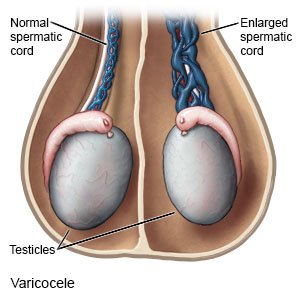Spermatic Vein Ligation
Medically reviewed by Drugs.com. Last updated on Apr 6, 2025.
A spermatic vein ligation is surgery to repair a varicocele. A spermatic vein ligation helps improve blood flow and decrease vein swelling. This may help improve the flow of sperm and improve fertility.
 |
DISCHARGE INSTRUCTIONS:
Call your local emergency number (911 in the US) if:
- You feel lightheaded, short of breath, and have chest pain.
- You cough up blood.
Seek care immediately if:
- Blood soaks through your bandage.
- Your stitches come apart.
- Your leg feels warm, tender, and painful. It may look swollen and red.
- You have increased pain at your surgery area or in your scrotum.
- Your surgery area is red, swollen, or draining pus.
Call your surgeon or urologist if:
- You have a fever or chills.
- You have nausea or are vomiting.
- You have questions or concerns about your condition or care.
Medicines:
You may need any of the following:
- Acetaminophen decreases pain and fever. It is available without a doctor's order. Ask how much to take and how often to take it. Follow directions. Read the labels of all other medicines you are using to see if they also contain acetaminophen, or ask your doctor or pharmacist. Acetaminophen can cause liver damage if not taken correctly.
- Prescription pain medicine may be given. Ask your healthcare provider how to take this medicine safely. Some prescription pain medicines contain acetaminophen. Do not take other medicines that contain acetaminophen without talking to your healthcare provider. Too much acetaminophen may cause liver damage. Prescription pain medicine may cause constipation. Ask your healthcare provider how to prevent or treat constipation.
- Take your medicine as directed. Contact your healthcare provider if you think your medicine is not helping or if you have side effects. Tell your provider if you are allergic to any medicine. Keep a list of the medicines, vitamins, and herbs you take. Include the amounts, and when and why you take them. Bring the list or the pill bottles to follow-up visits. Carry your medicine list with you in case of an emergency.
Drugs used to treat this and similar conditions
Omvoh
Omvoh is used to treat moderate to severe ulcerative colitis or Crohn's disease in adults. This ...
Asclera
Asclera (laureth-9 - polidocanol) is used to spider veins and varicose veins in the legs. Includes ...
Sodium tetradecyl sulfate
Sodium tetradecyl sulfate systemic is used for varicose veins
Care for your surgery area as directed:
Carefully wash the area with soap and water. Dry the area and put on new, clean bandages as directed. Change your bandages when they get wet or dirty.
Elevate your scrotum:
Elevate your scrotum by resting it on a rolled towel while you are lying down. This will help decrease swelling and pain.
Apply ice:
Apply ice on your scrotum for 15 to 20 minutes every hour or as directed. Use an ice pack, or put crushed ice in a plastic bag. Cover the bag with a towel before you apply it to your scrotum. Ice helps prevent tissue damage and decreases swelling and pain.
Wear an athletic supporter:
Wear an athletic support or snug briefs when you are up and walking around. This will help decrease pain, swelling, and pressure on your scrotum.
Return to activities as directed:
You may be able to return to your usual activities in about a week. This includes sexual activity. Avoid strenuous activity for 2 weeks. If you work in an office where you are less active, you can usually return in 2 days after surgery.
Follow up with your surgeon or urologist as directed:
You may need to return to have your stitches removed. Another semen sample may be checked in a few months. Write down your questions so you remember to ask them during your visits.
© Copyright Merative 2025 Information is for End User's use only and may not be sold, redistributed or otherwise used for commercial purposes.
The above information is an educational aid only. It is not intended as medical advice for individual conditions or treatments. Talk to your doctor, nurse or pharmacist before following any medical regimen to see if it is safe and effective for you.
Further information
Always consult your healthcare provider to ensure the information displayed on this page applies to your personal circumstances.
